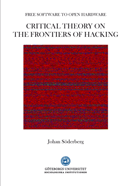David M. Berry, Giles Moss (eds.): Libre Culture: Meditations on Free Culture, 2nd ed. (2008)
Filed under book | Tags: · code, commons, copyleft, creative commons, critical theory, floss, free culture, free software, free speech, freedom, intellectual property, open hardware, open source, software, technology

“Libre Culture is the essential expression of the free culture/copyleft movement. This anthology, brought together here for the first time, represents the early groundwork of Libre Society thought. Referring to the development of creativity and ideas, capital works to hoard and privatize the knowledge and meaning of what is created. Expression becomes monopolized, secured within an artificial market-scarcity enclave and finally presented as a novelty on the culture industry in order to benefit cloistered profit motives. In the way that physical resources such as forests or public services are free, Libre Culture argues for the freeing up of human ideas and expression from copyright bulwarks in all forms.”
Publisher Pygmalion Books, Winnipeg, 2008
Res Divini Juris Libre Commons Licence
172 pages
via archive.org
PDF, PDF (updated on 2017-10-25)
Comment (1)Open Hardware Journal, No. 1 (2011)
Filed under journal | Tags: · 3d printing, hardware, open hardware, technology

“Open Hardware means sharing the design of physical or electronic objects with the public, similarly to Open Source software. The right to use, modify, redistribute, and manufacture, commercially or as a non-profit, is granted to everyone without any royalty or fee. Thus, Open Hardware designers hope to enrich society by developing a library of designs for useful objects that everyone can make, use, and improve.” (editor)
Editor: Bruce Perens
Published by Open Hardware organisation, 1 November 2011
30 pages
Compilation licensed under Creative Commons Attribution-NonCommercial-ShareAlike 3.0 United States
Articles licensed under Creative Commons Attribution 3.0 United States
Johan Söderberg: Free Software to Open Hardware: Critical Theory on the Frontiers of Hacking (2011)
Filed under thesis | Tags: · critical theory, critique, floss, free software, hacking, hardware, open hardware, software, technology

Starting from the experiences of hackers developing free software and open hardware, this thesis addresses some key and recurrent themes in the field of Science and Technology Studies (STS). It poses the question: how are technologies conceptualised, constructed and used in ways that render some aspects of them transparent, while leaving others opaque? This question is complicated by the fact that what is visible and transparent to some will remain opaque to others, depending on the level of technical expertise commanded. The political implications of this stand at the heart of my inquiry. Since technical know-how is unevenly distributed among groups in society, the same concern can be rephrased as follows: How are relations of power and conflict mediated through technology and relations of technical expertise/ignorance? While trying to address this question, the thesis delves into matters of epistemology. Just as programming skills are required for seeing what is going on behind the computer screen, so theoretically informed reflection can be considered necessary for rendering visible social relations not immediately apparent to the casual eye. Discussion of the actions of hackers is therefore combined in this thesis with discussion of the alternative programmes of research which can be applied to the study of these actions. Two programmes of research in particular receive attention: the critical theory of technology and constructivist science and technology studies (STS). Of these two, the relevance of the former tradition is emphasized and its value for research in the STS field defended. The thesis is composed of four articles and an introductory chapter summarizing and encapsulating my concerns. The first article discusses belief in technological determinism among hackers and how this does not necessarily stand in opposition to political engagement. On the contrary, it is common within hacker politics for contending viewpoints to be articulated in relation to seemingly apolitical narratives about technical neutrality and progress. The second article also deals with antagonistic relations at the heart of processes of technological change. It argues that the punitive actions of law enforcement agencies provide a clear indication of the presence of asymmetrical power relations in technological change through, for example, attempts to suppress filesharing inventions. Hackers are negotiating with legal authorities and the mass media, but also amongst themselves, about how to draw the line between the legitimate users and harmful misusers of technology. The third and fourth articles are based on a case study of a group of Czech hardware hackers who invented a wireless network technology for sending data with visible, red light. The challenges faced by these hardware hackers in their attempts to design technical solutions capable of being built by non-expert users are discussed at length in a theoretically-informed fashion.
PhD thesis
University of Gothenburg, Department of Sociology, March 2011
ISSN: 1650-4437
ISBN: 978-91-975442-7-6
68 pages
Creative Commons: Attribution-ShareAlike

